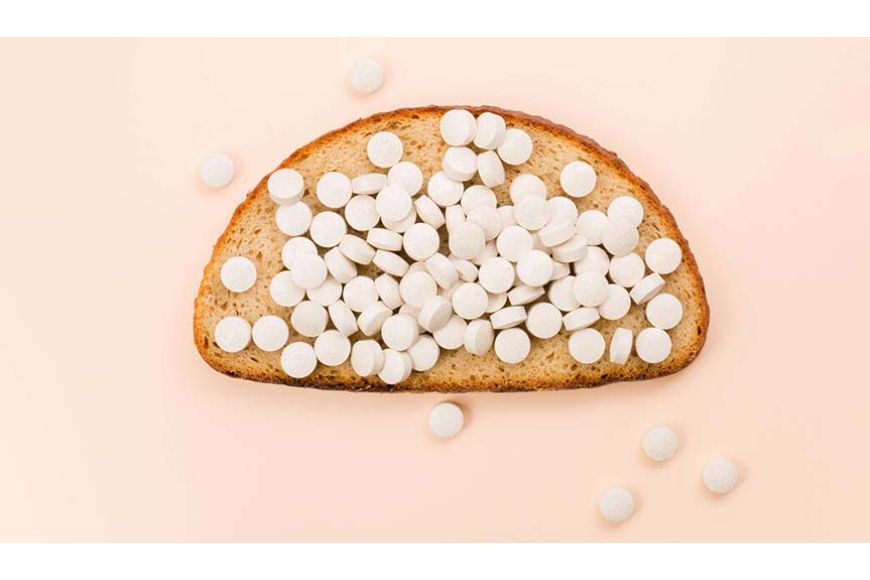Is Gluten Hiding in Your Medications?

There is a lot of uncertainty around gluten in prescription and over-the-counter medications. While the FDA regulates labeling for food and drink, currently there are only optional labeling guidelines for gluten in drug products.1 There is legislation on the congressional floor that if passed, would change the requirements for labeling gluten in medications. Because labeling for pharmaceutical products isn’t currently regulated, it’s important for consumers, especially those with celiac disease, to be informed on this topic.
Do Medications Contain Gluten?
The answer is complex. It is rare that medications will contain wheat gluten. However, it is possible that medications can still contain traces of gluten. There is also a potential for cross-contamination. If gluten is in your medication, it will most likely be in an inactive ingredient or an excipient. Excipients are the ingredients that help bind the pill together. The amount or type of excipient is not currently regulated by the FDA. Excipients may contain gluten, most often in the form of starch. There may also be starch ingredients that aren’t labeled as coming from a gluten-free source. These are some ingredients that may be derived from gluten2.
- Pregelatinized starches
- Sodium starch glycolate
- Dextrins
- Dextrose
- Maltodextrin
- Cyclodextrins
- Any excipient that contains the word starch by itself
If you come across these terms, it’s important to know the source of the starch. Talk with your pharmacist about these ingredients to determine if your medication is gluten-free. Sugar alcohols that may be derived from wheat sources will not cause a reaction for patients with celiac disease. These sugar alcohols are common excipients used in drug products.
- Mannitol
- Sorbitol
- Lactitol
- Xylitol
- Sorbitan
Your pharmacist can review every ingredient, including inactive ingredients, to make sure that it is safe for you to take.
How to Avoid Gluten in Your Medications
While gluten shouldn’t be an active ingredient in your medications, it is still important to take steps to avoid it. Make sure your pharmacist knows that you require gluten-free medications. Remind them each time you get a prescription filled. This is especially important if you switch from brand name to generic. Generic drugs are not required to have the same fillers or excipients as brand names. You should check that the generic form is safe for you to take. If you require a brand name drug, you may need to contact your insurance provider for approval. It’s also important for your pharmacist and doctor to know that you are gluten-free in case a drug produces symptoms that irritate or mimic celiac disease. Benicar, frequently used for high blood pressure, can cause severe gastrointestinal problems. Even though it doesn’t have gluten, patients with celiac disease should avoid it.
What if I Can’t Avoid Gluten?
Some medications may not have a gluten-free formulation. In this case, pharmaceutical compounding is necessary. This is when the pharmacist changes the medication to meet the needs of a patient. The pharmacist can reformulate the medication into a gluten free drug formulation. If your pharmacy doesn’t do pharmaceutical compounding, they can refer you to one that can. Here are some additional tips to help you avoid gluten:
- Read every over the counter and prescription label. It’s important to do your due diligence, even if you’ve talked with your pharmacist.
- Ask your doctor for a second-choice prescription if the first option is not gluten-free.
- Use resources like DailyMed and Pillbox to learn about the ingredients in your medications.
- Contact the drug manufacturer to confirm if the ingredient or drug is gluten-free. Sometimes, this is the only way to know.
- Call the manufacturer regularly to make sure the gluten-free status hasn’t changed.
- If you experience symptoms, talk to your doctor before you stop taking your medication.
Unfortunately, a lack of labeling regulations means that people with gluten intolerance or celiac disease need to be cautious with drug products. This also means that medications need to be assessed often, as inactive ingredients and fillers can change without warning. Even consuming small amounts of gluten can lead to adverse effects.
How to Save on Gluten Free Medications
You can easily save on your medications using the America's Pharmacy discount Rx card, discount Rx coupons, or drug price comparison mobile app. Your pharmacy, your medications, just cheaper!
Sources:
1. Gluten in Drug Products and Associated Labeling Recommendations Guidance for Industry
